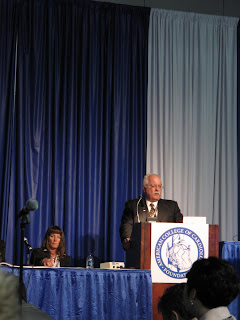
An implantable cardiac defibrillator (ICD), is a relative new cardiac rhythmic management device. Other similar cardiac rhythmic management devices include the well-known pace-maker. Different from the pace-maker, the ICD has a special wire, called a lead, which is implanted inside the heart, and can deliver an electrical shock to the heart muscle to adjust the heart beat. In the past decade, ICD market sharply increased 10 times, from 25,000 to 250,000.

Repetitive shocks are a medical emergency, which are associated with significant morbidity. An ICD is associated with a 2- or 5- fold increase in mortality, with the most common cause being progressive Heart Failure.
“Among patients with heart failure in whom an ICD is implanted for primary prevention, those who receive shocks for any arrhythmia have a substantially higher risk of death than similar patients who do not receive such shocks”--according to content showed by the speaker in ACC. About 65% of deaths were from progressive heart failure versus 35% arrhythmic deaths.
Only 20-35% of ICD shocks are appropriate. 33% are inappropriate shocks, while the last is “Phantom” shocks which only can be sensed by patients, but no record in ICD memory data.
 Cardiologists are looking for effective ways to reduce inappropriate ICD shocks to insure the patient security.
Cardiologists are looking for effective ways to reduce inappropriate ICD shocks to insure the patient security.Antiarrhythmic drugs are a controversial topic among experts about how to reduce the ICD shocks. Some scholars argue that these drugs can both decrease appropriate and inappropriate ICD shocks, but a few of them hold a counterview.
Catheter ablation may favorably affect mortality. Because it is effective in the short-term treatment of ventricular tachyarrhythmia storm by preventing it recurrence, it may play protective role over the long-term together with pharmacological therapy.
Other approaches to manage ICD inappropriate shocks are staying away from electromagnetic interference resource, and fixing a malfunctioning device if it is not working properly.
Inappropriate shocks are a frequent complaint of people with ICDs. I knew a tennis player of a certain age who was periodically knocked down on the court by his ICD, which mistook his exertion-induced tachycardia for something dangerous. I believe his partners called a "let" and replayed the point when this happened. It would be only fair.
ReplyDeleteThis is really interesting! It's not safe to assume that anything made by a human is fool-proof, but you'd like to think a device like this would be pretty close to perfect!
ReplyDelete